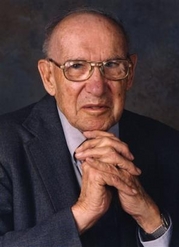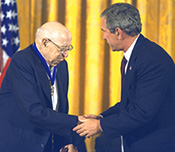LeadershipNow Remembers
Peter F. Drucker (1909-2005)
 Peter Ferdinand Drucker the most influential management writer of the modern era, died Friday, November 11th at 7:30am of natural causes at his home in Claremont, California. He was 95, just eight days shy of his 96th birthday.. Peter Ferdinand Drucker the most influential management writer of the modern era, died Friday, November 11th at 7:30am of natural causes at his home in Claremont, California. He was 95, just eight days shy of his 96th birthday..
Peter F. Drucker was born November 19, 1909 in Vienna and was educated there and in England. He earned his doctorate in public and international law while working as a newspaper reporter in Frankfurt, Germany, and afterward worker as an economist for an international bank in London.
In 1937 he came to the United States and two years later published his first book, The End of Economic Man. Drucker's management books and analyses of economics and society are widely read and respected throughout the world, with editions in more than twenty languages. He has also written a lively autobiography, two novels, and several volumes of essays. A frequent contributor to various magazines and journals over the years, Drucker is also an editorial columnist for the Wall Street Journal.
Drucker has had a distinguished career as a teacher, first as professor of politics and philosophy at Bennington College, the for more than twenty years as a professor of management at the Graduate Business School of New York University. Since 1971 he has been the Clark Professor of Social Science at Claremont Graduate School in California.

Experts in the worlds of business and academia regard Peter Drucker as the founding father of the study of management.
Drucker was awarded the Presidential Medal of Freedom in July 2002 by President George W. Bush in recognition for his work in the field of management. He received honorary doctorates from universities in the United States, Belgium, Czechoslovakia, Great Britain, Japan, Spain and Switzerland.
- It was Drucker who introduced the idea of decentralization—in the 1940s—which became a bedrock principle for virtually every large organization in the world.
- He was the first to assert—in the 1950s—that workers should be treated as assets, not as liabilities to be eliminated.
- He originated the view of the corporation as a human community—again, in the 1950s—built on trust and respect for the worker and not just a profit-making machine, a perspective that won Drucker an almost godlike reverence among the Japanese.
- He first made clear—still the '50s—that there is "no business without a customer," a simple notion that ushered in a new marketing mind-set.
- He argued in the 1960s—long before others—for the importance of substance over style, for institutionalized practices over charismatic, cult leaders.
- And it was Drucker again who wrote about the contribution of knowledge workers—in the 1970s—long before anyone knew or understood how knowledge would trump raw material as the essential capital of the New Economy.
Quotes:
• The 21st Century: "The 21st century will be the century of the social sector organization.The more economy, money, and information become global, the more community will matter. And only the social sector nonprofit organization performs in the community, exploits its opportunities, mobilizes its local resources, solves its problems. The leadership, competence, and management of the social sector nonprofit organization will thus largely determine the values, the vision, the cohesion, and the performance of the 21st century society."
• Changes: "Almost everybody today believes that nothing in economic history has ever moved as fast as, or had a greater impact than, the Information Revolution. But the Industrial Revolution moved at least as fast in the same time span, and had probably an equal impact if not a greater one."
• Management: "So much of what we call management consists in making it difficult for people to work."
• Education: "We now accept the fact that learning is a lifelong process of keeping abreast of change. And the most pressing task is to teach people how to learn."
Reactions:
Jack Welch, former chairman of General Electric Co.: "The world knows he was the greatest management thinker of the last century."
Tom Peters: "He was the creator and inventor of modern management. In the early 1950s, nobody had a tool kit to manage these incredibly complex organizations that had gone out of control. Drucker was the first person to give us a handbook for that."
Andrew S. Grove, Intel Corp.: "Like many philosophers, he spoke in plain language that resonated with ordinary managers. Consequently, simple statements from him have influenced untold numbers of daily actions; they did mine over decades."
Books:
Adventures of a Bystander
The Age of Discontinuity: Guidelines to Our Changing Society
The Daily Drucker : 366 Days of Insight and Motivation for Getting the Right Things Done
Peter Drucker: Shaping the Managerial Mind—How the World's Foremost Management Thinker Crafted the Essentials of Business Success by John E. Flaherty
The Effective Executive Revised
The Effective Executive: The Definitive Guide to Getting the Right Things Done (HarperBusiness Essentials)
The Effective Executive in Action: A Journal for Getting the Right Things Done
The Essential Drucker: In One Volume the Best of Sixty Years of Peter Drucker's Essential Writings on Management
The Executive in Action: Managing for Results, Innovation and Entrepreneurship, the Effective Executive
The Frontiers of Management: Where Tomorrow's Decisions Are Being Shaped Today
Innovation and Entrepreneurship
Management: Tasks, Responsibilities, Practices
Managing in a Time of Great Change
Managing in the Next Society
Management Challenges for the 21st Century
Peter Drucker: An Intellectual Journey by Ken Witty
Peter Drucker on the Profession of Management
The World According to Peter Drucker by Jack Beatty
|

